If you browse through the plethora of content on the web, you will notice many different voices saying several different things.
This blog is among them.
So what are these voices writing, podcasting and youtubing about as we venture into the 2nd month of 2023?
I Declare These Writings in a Nutshell

“I could be bounded in a nutshell and count myself king of infinite space.”
— William Shakespeare (Hamlet)
Writing Advice For Busy People
Martin Luther King Jr. once declared, “If you can’t fly, then run, if you can’t walk run, then walk, if you can’t walk, then , but by all means keep moving.” While you may not be able to soar now you can take action. Move towards your goal of being a writer! The tips in this article come from my experience and have proven to have worked for my impossibly busy schedule. Let’s now jump into these five actionable and simple strategies to help you write now!
- Be prepared to sacrifice
- Narrow and Nest into a Niche
- Find Five Minutes
- Consume Content Daily
- Repeat—Key is Consistency
My final strategy to help you write right now is simple—repeat strategies 1-4 daily!

―
Declaring Tim Power Novels
Tim Powers stands out from the crowd of contemporary novelists because he is a faithful Catholic who has somehow managed to swim in the toxic mainstream without compromising his faith or principles. This is a remarkable achievement in itself. It is not easy to make the New York Times Bestseller List without selling out to the demands and commands of the Zeitgeist.
Best known, perhaps, as the author of On Stranger Tides, which inspired the fourth of The Pirates of the Caribbean films, his finest novel is probably—or arguably—Declare, a supernatural spy thriller set against the backdrop of World War II and the Cold War.
Declare in a Nutshell – Crisis Magazine
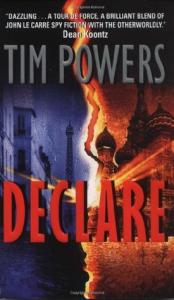
“To put it in a nutshell, he was afflicted with a love of literature. It was the fatal nature of this disease to substitute a phantom for reality.”
— Virginia Woolf (Orlando)
More Power Stories
“Lions, Harts, Leaping Does” (1943) earned the then-twenty-six-year-old writer his first serious attention and established the subjects and themes that would mark his work over the next five-and-a-half decades. Powers demands a great deal from the would-be allegorical reader—even from many of those who come from within the Catholic milieu, and perhaps more so now than in 1943. Recognizing John of the Cross, Thomas Aquinas, and Bede between Powers’s lines is difficult, but there is little doubt they may be found there. The story holds lessons for writers, too: In “Lions,” Power offers an object lesson in the use of extratextual references and the nearly inevitable tradeoffs between a story’s depth and reach that are commonly risked by writers from any deeply resourced literary tradition. The hidden bookshelf torments poor Father Didymus; it also enriches the contemplations of Powers’s ideal reader.
How many of those was he able to find? Whether Powers at age twenty-six yet understood the limits he was placing on the appeal of his work by his choice of subject and his high expectations of readers’ curiosity is a question for a more definitive biographer to answer.
The Hidden Bookshelf of J. F. Powers | Church Life Journal | University of Notre Dame (nd.edu)

“Sometimes, you read a book and it fills you with this weird evangelical zeal, and you become convinced that the shattered world will never be put back together unless and until all living humans read the book.”
― The Fault in Our Stars
SGD 2022 Movies of the Year List
Many of these films are low-key, even contemplative in tone, but 2022 also had its share of over-the-top, maximalist spectacle: the blockbuster mega-sequels Top Gun: Maverick and Avatar: The Way of Water; Baz Luhrmann’s overstuffed Elvis; the ostentatiously excessive Glass Onion; the sprawling Telugu-language epic RRR; and, perhaps most of all, the multiverse-spanning kung-fu mother-daughter melodrama Everything Everywhere All at Once. Next to these powerhouse entertainments, the likes of Doctor Strange and the Multiverse of Madness and Black Panther: Wakanda Forever look dull and paltry. (Matt Reeves’s The Batman doesn’t look paltry, but I need to see the sequel before I can form a proper opinion of it. I haven’t seen Black Adam and I’m okay with that.)
Films of memory and identity: My favorites of 2022 – Catholic World Report
Ant Man and Back to the Future
Quantumania was directed by Peyton Reed, who also helmed the previous two Ant-Man movies — not to mention comedies like Bring It On, Down with Love and every episode of the underrated TV flop The Weird Al Show. But before all that, Reed significantly impacted another iconic sci-fi-comedy franchise: Back to the Future.
Reed began his career by directing behind-the-scenes documentaries for Back to the Future Part II and Back to the Future Part III. He also made The Secrets of the Back to the Future Trilogy, hosted by Kirk Cameron, who somehow refrained from commenting on whether or not Marty and his godless scientist pal would be left behind during the rapture.
‘Ant-Man’ Director Peyton Reed Is a ‘Back to the Future’ Legend | Cracked.com
“I wish it need not have happened in my time,” said Frodo.
“So do I,” said Gandalf, “and so do all who live to see such times. But that is not for them to decide. All we have to decide is what to do with the time that is given us.”
― The Fellowship of the Ring
Holy Spirit as Jazz
Abird or a flame. Traditionally, these are the most common images used as metaphors for the Holy Spirit.
Despite the apparent hegemony of birds and flames, a wide range of metaphors have been used for the Holy Spirit over the Christian centuries. Since there is no doctrinal claim about how exactly the Spirit is to be depicted, Christians have broad leeway in drawing on experience and imagery to assist them in attending to, thinking about and praying to the Holy Spirit.
We are reminded of St. Bernard of Clairvaux’s deeply incarnate and physical metaphor of the Holy Spirit as kiss; St. Bonaventure’s description of the Spirit as flowing water, as transformer of the affections and divine abundance; and St. Catherine of Siena’s image of the Spirit as mercy and waiter. This second image from Catherine is particularly moving. She envisions the Holy Trinity as “table, food and waiter,” in which the Spirit is the one who serves us the Word who is our food — a great eucharistic image.
Beyond birds and flames: Let’s think of the Holy Spirit as jazz music | National Catholic Reporter (ncronline.org)

“I never liked jazz music because jazz music doesn’t resolve. But I was outside the Bagdad Theater in Portland one night when I saw a man playing the saxophone. I stood there for fifteen minutes, and he never opened his eyes.
After that I liked jazz music.
Sometimes you have to watch somebody love something before you can love it yourself. It is as if they are showing you the way.
I used to not like God because God didn’t resolve. But that was before any of this happened.”
― Blue Like Jazz: Nonreligious Thoughts on Christian Spirituality
A Mass for Janis Joplin
I had to give another listen to Joplin’s signature performance myself, and I clicked it on. The appropriately psychedelic video includes numerous shots of Joplin — smiling, singing, laughing, full of life. Even so, I knew it’d been a hard life — you can hear it plain as day in “Bobby McGee” — and that Joplin died young. “I should have a Mass said for her,” I said to myself, so that’s what I did.
Which is where we all are — we, meaning you and me, those of us down here, fussing and futzing in the Church militant, along with all those suffering souls in Purgatory rising, rising, ever rising, assisted by our prayers, sacrifices, and, yes, Masses. We have Masses said for our deceased grandmas and uncles and other loved ones because we don’t want to take anything for granted — because we can’t know where they are on the purgatorial path, and there’s nothing better we can do for them than to direct some supernatural oomph their way.
The same goes for Janis. All we know is that she’s dead, and that heaven is what she was destined for — what she was created for. I’ll give her the benefit of the doubt that she immediately recognized Love incarnate at the moment of her death; that she knelt, bowed her head, and uttered her definitive Fiat; that she’s heaven bound now, and could use a celestial lift.
Why I Had a Mass Offered for Janis Joplin| National Catholic Register (ncregister.com)Why I Had a Mass Offered for Janis Joplin| National Catholic Register (ncregister.com)
“In a nutshell, when life is pleasant, think of others. When life is a burden, think of others.”
— Pema Chödrön (The Pocket Pema Chodron)
Mystery of Christ’s Childhood
The whole childhood of Christ is a mystery of poverty: born in a manger, born in the poor and lowly town of Nazareth, and subjecting Himself to be redeemed Who is the Redeemer of all. He was redeemed by two turtledoves since the Holy Family could not afford the lamb otherwise required by the Law of Moses. St. Bede appositely quotes from Paul to explain the Presentation: ‘you know the grace of our Lord Jesus Christ, that being rich he became poor, for your sakes; that through his poverty you might be rich’ (2 Corinthians 8:9). And so He ‘wished the poor man’s victim to be offered for Him just as in His birth He was wrapped in swaddling clothes and laid in a manger’ (ST III, q. 37, a. 3, ad. 4).
Our Lord did not need to be redeemed; Our Lady did not actually need to be purified. Aquinas taught that Christ submitted Himself to circumcision and the other burdens of the Law to teach us the value of humility, obedience, and to show His approval of the Law; and that Mary did likewise since ‘it was becoming that the mother should be like her Son in humility’ (ST III, q. 37, a. 4, co.).
The Mystery of Candlemas: Fourth Joyful Mystery – OnePeterFive
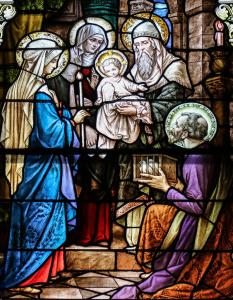
“In a nutshell, the Bible from Genesis 3 to Revelation 22 tells the story of a God reckless with desire to get his family back.”
— Philip Yancey (The Jesus I Never Knew)
School of the Sacraments
God teaches us what love is through the sacraments. He teaches us, not just through the words, but through the actions that the priest and we perform. The words touch our minds and the actions touch our bodies, our senses, our emotions and from there penetrate our hearts that we may know how to recognize God’s love. Love is only known from the experience of being loved. It cannot be taught by concepts. We come to the sacraments to experience God’s love. That love transforms us, if we let it, and, having been transformed, we can go out to touch and transform the lives of others with the same love.
The sacraments exist to transform us. The ministerial priesthood exists to celebrate the sacraments, which are given by Christ to perfect us as His members. The priesthood of the faithful exists to share that transformation with others and with the world. This is the Whole Christ in action. This is why “creation waits with eager longing for the revealing of the children of God; … in hope that the creation itself will be set free from its bondage to decay and will obtain the freedom of the glory of the children of God.”
The Whole Christ – Where Peter Is
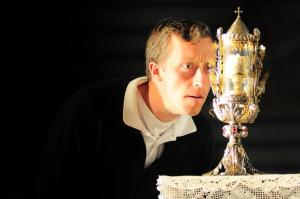
“Next to the Blessed Sacrament itself, your neighbor is the holiest object presented to your senses.”
― The Weight of Glory
Death, Judgement, Heaven and Hell
“The fear of death follows from the fear of life. A man who lives fully is prepared to die at any time.”
―
Means of Grace
Grace is offered every day to us, like the sun melting away the darkness. Grace is offered in every snow, and in every drop of water we drink, and in every smile we see, whether we see it or not. God’s grace is the very air we breathe, even when the air quality isn’t great. God’s gift is the part that sustains. If we want a less destructive world, we must examine how we personally, both in big and small ways, contribute to the suffering of the world –by our careless words online and in real life, by our refusing to look at where we can help, or the make space in our busy lives to offer that help. We must go out –the Holy Spirit must be sent out, if we are disciples –Christ longs to touch every heart, and we are called to be the means.
The World Keeps Thinking It Knows But it Does Not | Sherry Antonetti (patheos.com)
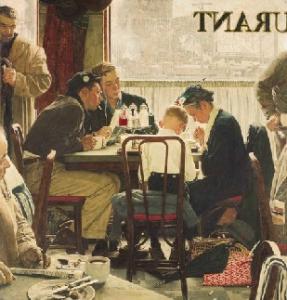
“Everybody can be great…because anybody can serve. You don’t have to have a college degree to serve. You don’t have to make your subject and verb agree to serve. You only need a heart full of grace. A soul generated by love.”
―
Nothing in this famous painting is what it seems.
A short video essay about the photo Grace by Eric Enstrom
“Every portrait that is painted with feeling is a portrait of the artist, not of the sitter.”
― The Picture of Dorian Gray
Mardi Gras Catholic?
Although its deepest roots may tap into pre-Christian Roman customs, the middle roots certainly delve into medieval Catholic Europe. Forty-seven days before Easter, there was a day called, in English, Shrove Tuesday. “Shrove” comes from the Middle English word shrive, which refers to the sacrament of reconciliation. It was a time of preparation and celebration before Ash Wednesday, the beginning of Lent.
As Shrove Tuesday developed, two main threads emerged: food and festivals. In many European locations, where food scarcity was common, a community would use up all of its supplies that would be forbidden during Lent: butter, eggs, lard, meat, milk, sugar, etc. These would be turned into rich foods—like the aforementioned pączki. It would be a moment of communal joy before a season of communal fasting. This tradition of eating indulgent foods spanned many European cultures and their diasporas: pancakes in the United Kingdom and Ireland, fastnacht in Germany, malasada brought from Portugal to Hawaii, beignets in France and New Orleans, and, of course, pączki in Poland and Chicago
Is Mardi Gras a Catholic holiday? – U.S. Catholic (uscatholic.org)

“Deliverance is to the Bible what jazz music is to Mardi Gras: bold, brassy, and everywhere.”
―
Wonder with Jonathan Roumie
Word on Fire is excited to announce the premiere of a new film series exploring the intersection of faith and science.
Narrated by The Chosen’s Jonathan Roumie, this film series was produced through the support of the John Templeton Foundation.
“Wonder: The Harmony of Faith & Science” Film Series – Word on Fire
“The important thing is not to stop questioning. Curiosity has its own reason for existence. One cannot help but be in awe when he contemplates the mysteries of eternity, of life, of the marvelous structure of reality. It is enough if one tries merely to comprehend a little of this mystery each day.
—”Old Man’s Advice to Youth: ‘Never Lose a Holy Curiosity.'” LIFE Magazine (2 May 1955) p. 64”
―



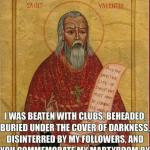
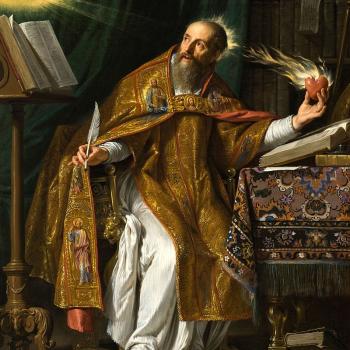


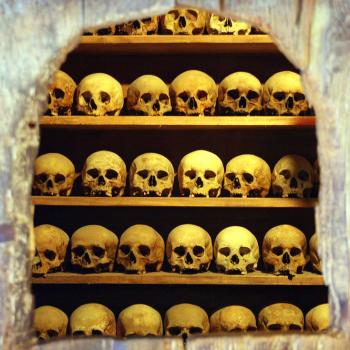






Heaven and Hell are real. Meditate on these final things. Right out of The Catechism of the Catholic Church.
katie+ 4 weeks ago Have mercy on me O Lord a sinner+!!!!!